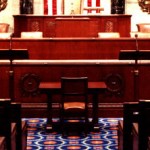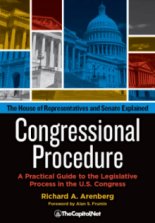Floor / Aisle / Candy Desk / Gallery (CongressionalGlossary.com)
From the Congressional Glossary – Including Legislative and Budget Terms Floor / Aisle / Candy Desk / Gallery “The Floor” describes the actual physical chambers of the House and the Senate, in the Capitol Building, in Washington, DC. These are the only places where legislation can pass. The aisle is the space between the minority … Read more



